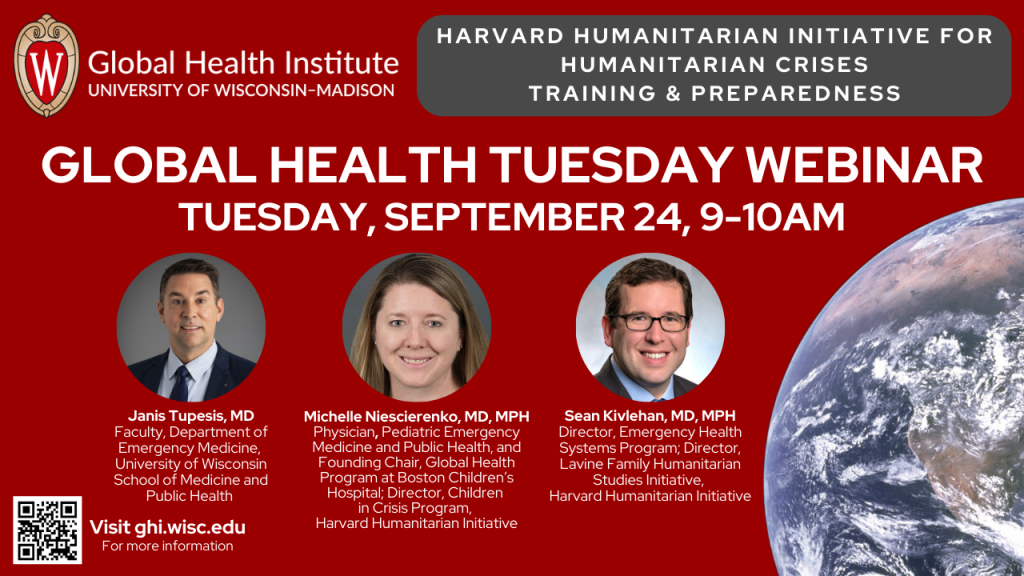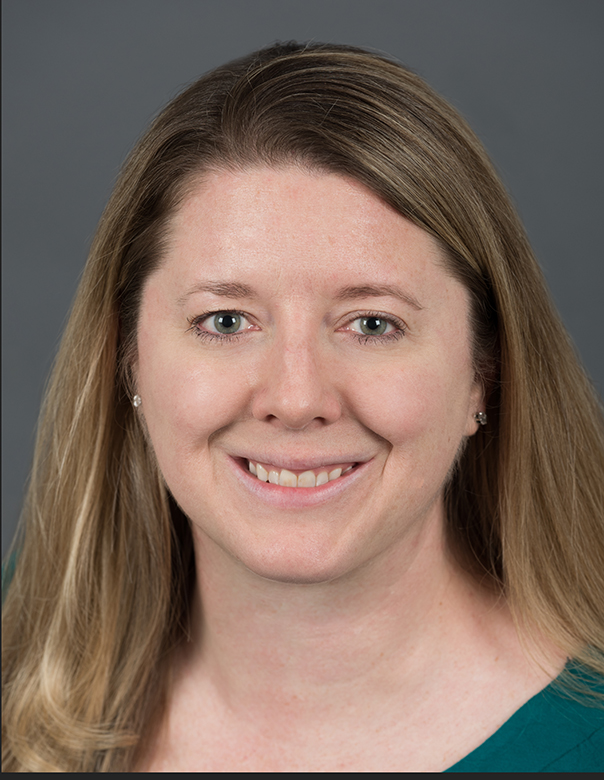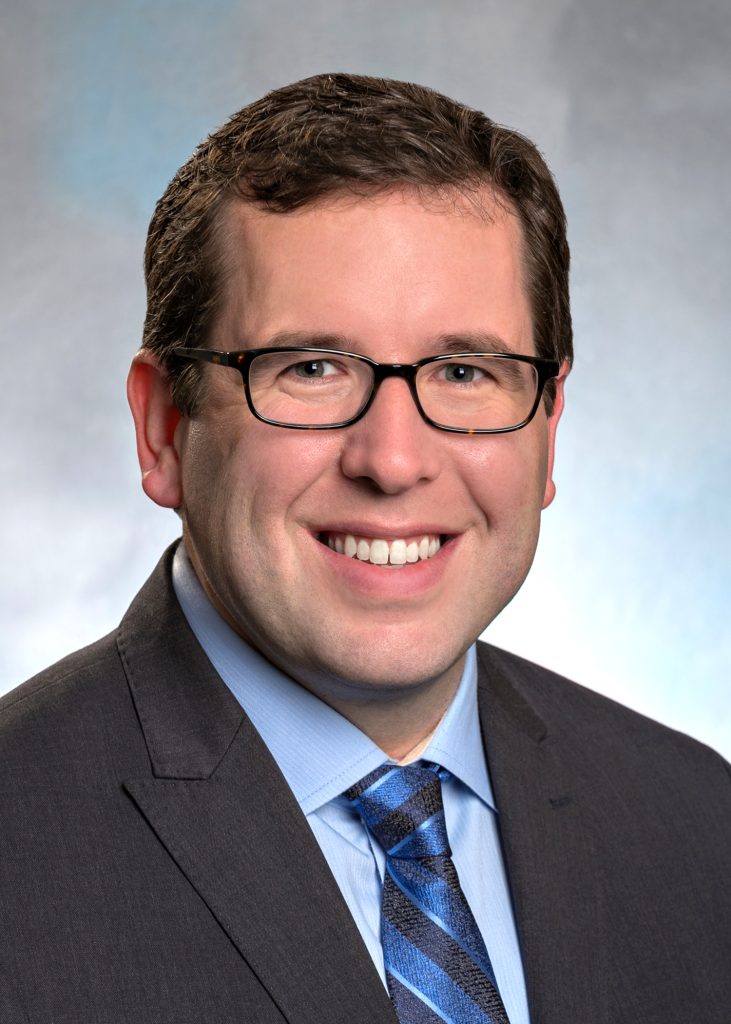
We welcome you to join us for GHI’s next Global Health Tuesday Webinar on Tuesday, September 24, 2024, from 9-10am (CST), when UW–Madison Global Health Institute Advisory Committee Member Janis Tupesis moderates a timely conversation with the Harvard Humanitarian Initiative for Humanitarian Crises Training & Preparedness.
Panelists include: Michelle Niescierenko and Sean Kivlehan.
Here is a link to the recording on GHI’s YouTube Channel.
Meet the Moderator:

Dr. Tupesis completed his residency training at the University of Chicago Hospitals and Clinics where he served as the associate residency program director, a position he held until joining the Emergency Medicine faculty at the University of Wisconsin School of Medicine and Public Health. He served as the Department of Emergency Medicine’s Residency program director until 2014, overseeing the program’s initial accreditation and expansion to its current form. At the same time, he served as the chairperson of UW Health’s Graduate Medical Education Global Health Committee. He is a former associate director and current advisory committee member of the University of Wisconsin-Madison’s Global Health Institute.
He is involved in projects involving establishing graduate medical education programs in resource limited settings in both Liberia, Ethiopia and South Africa – partnering with multiple other academic institutions. In 2018, he begun work with the World Bank and the Association of African Universities on the Africa Centers of Excellence for Development (ACE Impact) Project, which aims to improve the quality, quantity and development impact of postgraduate education in selected universities through regional specialization and collaboration.
Since 2015, he has been working as a volunteer technical consultant at the Emergency, Trauma and Acute Care Programme within the Department for Management of Noncommunicable Diseases, Disability, Violence and Injury Prevention at the World Health Organization. He continues to work as one of the founding faculty members of the newly formed Academic Consortium for Emergency Systems (ACES), a consortium of academic global health programs to support the work of aforementioned WHO Programme.
He serves on multiple international global health education committees, including on the Board of Directors for the International Federation for Emergency Medicine (IFEM), and with the African Federation for Emergency Medicine (AFEM), American College of Emergency Medicine (ACEP) and the Society for Academic Emergency Medicine’s Global Emergency Medicine Academy (GEMA), and he is a Fellow in the Faculty of Sports and Exercise Medicine with the Royal College of Surgeons in Ireland. In 2018, he was awarded the Presidential Lifetime Achievement Award by GEMA for his work on emergency care health and education systems development.
Dr. Tupesis is also a faculty co-advisor for UW–Madison’s engagement with the UNDP, Engineers Without Borders, and other partners focusing on facilitating capacity building and systems strengthening work around COVID-19 response in low and middle-income countries. As faculty co-advisor, Dr. Tupesis is responsible for co-chairing a working group of UW faculty, staff, students, and other partners and coordinating engagement with various partner organizations.
Dr. Tupesis’ outside interests include travel, adventure medicine and mountaineering, UW athletics, and spending time with his wife and children.
Meet the Panelists:

Michelle Niescierenko, MD, MPH is a Pediatric Emergency Medicine and Public Health physician and founding chair of the Global Health Program at Boston Children’s Hospital, as well as director of the Children in Crisis program at the Harvard Humanitarian Initiative. The Boston Children’s Global Health Program is partnership-based, working to improve child health through research, program implementation and education globally. She has experience in pediatric care, public health and health systems building with host country governments in more than 30 countries, on 5 continents as well as with the WHO, the World Bank, US CDC, USAID and various global non-governmental organizations.
Her career focus is on building sustainable systems in fragile economic, humanitarian and conflict settings. In Liberia she provided pediatric humanitarian aid in the immediate post-conflict setting brought local hospitals together with US academic institutions which extended to 16 years of partnership. During the 2014-2017 Ebola outbreak she led the Liberian public hospital response utilizing rapid deployment of local healthcare workers to provide training reaching 23 hospitals and >5,000 health workers. Post-Ebola she led the collaboration to launch Liberia’s first pediatric residency now with 25 pediatricians trained.
Dr. Niescierenko has provided pediatric advanced life support training to Palestinian hospitals in the West Bank/Gaza, assessed hospitals in northern Iraq after the liberation of Mosul, implemented neonatal care protocols on 5 major islands in Indonesia, provided technical assistance to 17 universities across 5 West African countries utilizing performance-based financing to train more than 2,000 future health sciences professionals.
Using lessons learned from Ebola she supported the Boston Children’s ER COVID-19 response while implementing a novel program with the Boston Public School Nurses for safe return to school. She led a BCH based team who conducted the assessment of covid in humanitarian settings for the WHO’s COVID-19 Task Team.
Current work focuses on developing comprehensive emergency care for the more than 100 million people in Bihar state, training Ukrainian health workers in pediatric trauma care and scaling a novel partnership to provide pediatric care to American Indians of the Lakota, Nakota and Dakota Tribes in South and North Dakota.

Sean Kivlehan, MD, MPH is the director of the Lavine Family Humanitarian Studies Initiative at Harvard and director of the Emergency Health Systems Program at the Harvard Humanitarian Initiative. He is an Assistant Professor of Emergency Medicine at Harvard Medical School and of Global Health and Population at Harvard Chan School of Public Health. He is an emergency physician at Brigham and Women’s Hospital, where he also serves as the director of the Global Emergency Medicine Fellowship. He has served as a consultant to the World Health Organization, was a New York City paramedic for ten years, and works to strengthen emergency care quality and access around the world through local and regional partnerships.
